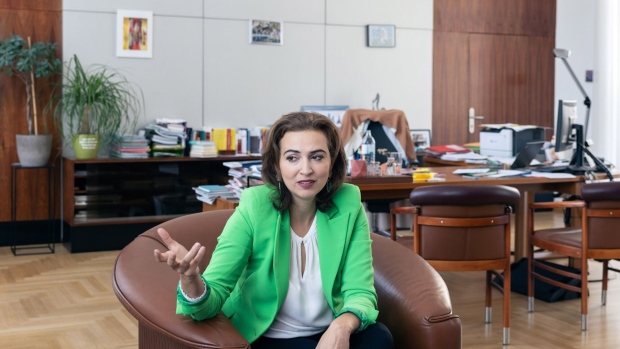Oct 10, 2023
Death Threats and Disinformation: the Everyday Poison of Politics in Europe
, Bloomberg News

(Bloomberg) -- Austria is losing the battle against disinformation, according to Justice Minister Alma Zadic.
With misleading and hateful content surging online, Zadic believes that public institutions simply don’t have the resources to match the output of bad actors. “We cannot compete, in particular when it comes to disinformation or conspiracy theories,” the 39-year-old Green Party minister said in an interview last month in Vienna.
While mis- and disinformation are testing democratic institutions around the world, in Austria these issues are now playing out around a former chancellor who will stand trial later this month on charges of corruption related to delivering false testimony to parliament. Sebastian Kurz, a member of the conservative People’s Party who served as chancellor between 2017 and 2021, has separately been accused of fueling disinformation by using public money to plant fabricated opinion polls in Austria’s tabloid media before he took office.
Kurz, who quit politics after prosecutors opened an investigation into the matter, denies any wrongdoing. The case has become a lightning rod for online conspiracy theorists, and in the run-up to the trial Zadic said she has been focused on bolstering the legitimacy of the country’s judicial system in the eyes of the public.
Since the invasion of Ukraine, there has been a surge in disinformation originating in Russia or seeking to serve Russian interests. Last month, the European Commission published a study which found that 8% to 9% of all accounts on X and Meta’s Facebook platform in Spain, Poland and Slovakia were engaged in disseminating false information, much of it connected to Russia.
With European parliamentary elections taking place next June, many officials share Zadic’s concern that democratic institutions won’t be able to cut through this noise.
“This is a multi-million-euro weapon of mass manipulation,” European Commission Vice President Vera Jourova as she presented the report. “We have to expect that the Kremlin and others will be active before our European elections.”
Complicating matters further is the fact that some elected officials have been willing to promote false information. In the last year, Reporters Without Borders said that political actors were involved in disinformation and propaganda campaigns in two-thirds of the countries it surveyed.
Since leaving politics, Austria’s former chancellor has become a global strategist for Thiel Capital, the investment firm run by billionaire Trump donor Peter Thiel, and has participated in social media campaigns to persuade the Austrian public that he is the victim of an elaborate set-up. His tactics are fairly typical of populists, who often use social media to bypass traditional institutions and media and directly appeal to the public.
Separately, two recent documentaries about Kurz’s rise to power have sought to burnish his image. Neither focus on the ongoing corruption investigations and both paint a sympathetic portrait of the former premier as a popular politician unfairly pushed out of office. It’s unclear who paid for the films, one of which debuted with several current and former ministers in attendance. Kurz has denied any financial involvement.
All this is unfolding in a media landscape already polluted with disinformation. In Austria, the far-right Freedom Party regularly uses social media to disseminate inaccurate information and conspiracy theories about the dangers of vaccines, Russia and the so-called global elite. The party is leading in the polls ahead of next year’s general election.
Since taking office in 2020, Zadic has become intimately acquainted not only with mis- and disinformation, but also with online harassment and bullying. After becoming Austria’s first minister with an immigrant background, the Bosnian-born politician was deluged with hate mail and death threats, and assigned a 24-hour security detail.
Her experience wasn’t an outlier. Research by the Inter-Parliamentary Union, an organization of national parliaments, found that while women make up only 26 percent of parliamentarians around the world, almost 80 percent of them have been subjected to online bullying and harassment, and two out of five have faced threats of sexual violence and death.
To Zadic, such threats reflect the toxic political culture that she and other elected officials are now fighting to rein in.
“There’s nothing more dangerous than delegitimizing our institutions,” Zadic said. “Weakening the trust in these institutions means wakening the trust in the rule of law and eventually the trust in our democracy.”
©2023 Bloomberg L.P.







